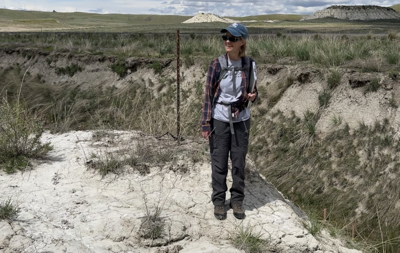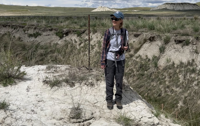Douglas County is witnessing significant successes in wetland restoration and regenerative farming, thanks to the dedicated efforts of the Foster Creek Conservation District (FCCD) and their partners. With a strong connection between the local community and the landscape, the FCCD, in collaboration with the Colville Tribe and Department of Ecology, has been actively restoring Foster Creek since 2015. These restoration efforts have been further bolstered by new grant funding from Ecology, enabling the district to work towards their goals of restoring the watershed, monitoring water quality, and improving soil health. The projects are scheduled for completion by 2025 and hold great promise for the region.
One of the primary focuses of FCCD's efforts has been the transition from conventional tilling to direct seed regenerative agricultural practices. Recognizing the importance of regenerative farming in the face of a warming climate, FCCD has partnered with Ecology since 2016 to convert over 750 acres of farmland. This shift has cultivated richer and healthier soils, capable of trapping more carbon, retaining more water during droughts, and promoting greater food production. By adopting these sustainable practices, farmers in Douglas County are not only preserving the environment but also securing the future viability of their farms.
Addressing the issue of erosion is another key concern for the FCCD. Erosion leads to decreased air quality due to the rise of dust particles and can also have detrimental effects on aquatic ecosystems. Sediments entering streams hinder the availability of dissolved oxygen, essential for the survival of aquatic life. To combat erosion and improve water quality, FCCD plans to expand water quality and streamflow monitoring efforts in the region. Monitoring parameters such as flow, temperature, pH, and dissolved oxygen will provide valuable data to guide the necessary steps for creating a favorable environment for salmon and steelhead populations, particularly as they exit the Columbia River. Additionally, FCCD aims to deliver cool water downstream to Foster Creek, further enhancing its suitability as a habitat for these important fish species.
Education and community involvement are vital aspects of the restoration projects in Douglas County. In April, FCCD organized the Salmon in the Classroom program, allowing local children to participate in releasing 250 salmon into Foster Creek. This hands-on experience helps foster a sense of stewardship and conservation among the younger generation, ensuring the continuity of these restoration efforts in the years to come.
One notable project undertaken by FCCD is the Mary Jane Hill site, where they collaborated with Ecology's Washington Conservation Corps to construct a new pond. This pond serves multiple purposes, such as increasing water retention on the landscape, supporting the growth of shade-providing shrubs, trapping sediments, and slowing down the flow of water. These features contribute to a cleaner and more supportive downstream environment for aquatic life. Moreover, by expanding the wetlands, the pond plays a crucial role in carbon sequestration, helping mitigate the effects of climate change.
Tree and shrub planting has been another significant achievement in the region. Between the Mary Jane Hill and Chalk Hills project sites, FCCD planted an impressive total of 1,519 trees and shrubs, primarily dogwoods and willows. Willow trees, which are already common in the area, not only penetrate the brush but also create shade that allows other species to thrive. These efforts contribute to the overall restoration of the ecosystem and enhance biodiversity in the region.
To aid in the restoration of Foster Creek, FCCD has constructed structures made from natural materials found nearby. These structures, built in 2021 following the Pearl Hill Fire that ravaged the area, serve to filter sediments and regulate the flow of water. By utilizing locally available resources, FCCD ensures sustainable practices that align with the natural landscape.
The successes achieved in wetland restoration and regenerative farming in Douglas County are a testament to the commitment and collaborative efforts of the FCCD, the Colville Tribe, and Ecology. These initiatives not only restore the health of Foster Creek and its surrounding ecosystem but also provide a model for sustainable land management that can be replicated elsewhere. Through their dedication, the community of Douglas County demonstrates the profound impact that proactive conservation and regenerative practices can have on the landscape, fostering a solid relationship between people and nature for generations to come.


